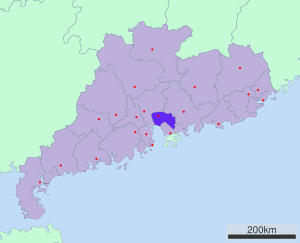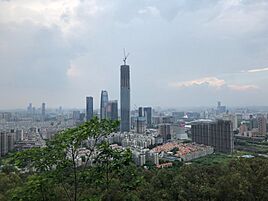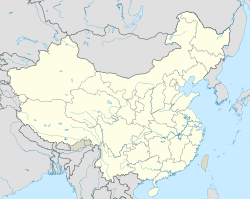Dongguan facts for kids
Quick facts for kids
Dongguan
东莞市
Tungkun; Tungkuan
|
|
|---|---|
|
Prefecture-level city
|
|
|
Dongguan CBD
Dongguan Avenue
Humen Mountain
Yinxian Mountain Resort
Keyuan
|
|

Location of Dongguan in Guangdong
|
|
| Country | China |
| Province | Guangdong |
| County | 331 AD |
| City (County-level) | September 1985 |
| City (Prefecture-level) | 1 January 1988 |
| Municipal seat | Nancheng Subdistrict |
| Government | |
| • Type | Prefecture-level city |
| • Body | Dongguan Municipal People's Congress |
| Area | |
| • Prefecture-level city | 2,465 km2 (952 sq mi) |
| • Urban | 2,465 km2 (952 sq mi) |
| • Metro | 19,870.4 km2 (7,672.0 sq mi) |
| Elevation | 8 m (26 ft) |
| Population
(2020 census)
|
|
| • Prefecture-level city | 10,466,625 |
| • Density | 4,246.1/km2 (10,997.3/sq mi) |
| • Urban | 10,466,625 |
| • Urban density | 4,246.1/km2 (10,997.3/sq mi) |
| • Metro | 65,655,622 |
| • Metro density | 3,304.192/km2 (8,557.819/sq mi) |
| GDP | |
| • Prefecture-level city | CN¥ 1.086 trillion US$ 168.3 billion |
| • Per capita | CN¥ 103,284 US$ 16,010 |
| Time zone | UTC+8 (China Standard Time) |
| Postal code |
523000
|
| Area code(s) | 769 |
| ISO 3166 code | CN-GD-19 |
| Licence plate prefixes | 粤S |
| City flower | Yulan magnolia Magnolia denudata |
| Dongguan | |||||||||||||||||||||||||||||||||
|---|---|---|---|---|---|---|---|---|---|---|---|---|---|---|---|---|---|---|---|---|---|---|---|---|---|---|---|---|---|---|---|---|---|

"Dongguan" in Simplified (top) and Traditional (bottom) Chinese characters
|
|||||||||||||||||||||||||||||||||
| Simplified Chinese | 东莞 | ||||||||||||||||||||||||||||||||
| Traditional Chinese | 東莞 | ||||||||||||||||||||||||||||||||
| Hanyu Pinyin | Dōngguǎn | ||||||||||||||||||||||||||||||||
| Cantonese Yale | Dùnggún or Dūnggún | ||||||||||||||||||||||||||||||||
| Postal | Tungkun | ||||||||||||||||||||||||||||||||
| Literal meaning | "Eastern Bulrush(es)" | ||||||||||||||||||||||||||||||||
|
|||||||||||||||||||||||||||||||||
Dongguan is a big city in Guangdong Province, China. It's a very important industrial city in the Pearl River Delta area. Dongguan is located near Guangzhou to the north and Shenzhen to the south. The city is part of a huge urban area with over 65 million people.
Dongguan is known for attracting businesses from other countries. It's one of the top cities in China for exports, sending out billions of dollars in goods. The city is also home to one of the world's largest shopping malls, the New South China Mall. While many people originally spoke Cantonese or Hakka, most people in Dongguan today speak Mandarin. This is because many people have moved there from other parts of China for work. Dongguan also has several universities, like Guangdong University of Science and Technology.
Contents
Economy and Industry
Dongguan is a major center for making things. It was one of the first places in the Pearl River Delta where local groups and foreign companies worked together. This helped the city grow very quickly.
Today, Dongguan is a huge manufacturing hub. This means many factories are located here. The biggest industry is making electronics and communication equipment. Famous international companies like DuPont, Samsung Electronics, and Nokia have factories in Dongguan.
The city also focuses on technology. The Dongguan Science and Technology Museum opened in 2005. It shows how much the city wants to attract tech businesses. Dongguan has invested a lot of money to improve its technology. The city is seen as a key area for future technology growth in China.
History of Dongguan
People have lived in the Dongguan area for about 5,000 years. In 1839, a big historical event happened here. Large amounts of opium were destroyed in Humen Town, which is now part of Dongguan. This event helped start the First Opium War.
During World War II, Dongguan was a base for groups fighting against the Japanese occupation.
Dongguan became a city in 1985. Three years later, it became a "prefecture-level city," which is a higher status. During this time, Dongguan changed from a farming town to a busy manufacturing center. Its economy grew very fast, sometimes by 18% each year!
Geography and Climate
Dongguan has a mix of landscapes. It's mostly hilly in the east and flat in the west. It also has a long coastline. The city center is about 50 kilometers from Guangzhou and 90 kilometers from Shenzhen. It's also close to Hong Kong and Macau by water. This location makes it a great place for land and sea transport.
About 27% of Dongguan's area is water, and 25% is covered by forests. The city has a humid subtropical climate. This means it has warm temperatures and lots of rain throughout the year. The average temperature is about 22.9 degrees Celsius (73.2 degrees Fahrenheit).
Population and Culture
Dongguan has a large and growing population. In 2020, about 10.5 million people lived there. Many people have moved to Dongguan from other parts of China for work.
Dongguan is also special because it's the original home for many overseas Chinese. This includes over 700,000 people in Hong Kong, Taiwan, and Macau. It's also the ancestral home for over 200,000 Chinese people living in other countries.
Transportation Hub
Dongguan has good connections for travel.
Air Travel
People flying to Dongguan can use Guangzhou Baiyun International Airport or Shenzhen Bao'an International Airport. Many also use Hong Kong International Airport. From Hong Kong Airport, you can take a ferry directly to Humen Ferry Terminal in Dongguan. There are also bus services connecting Dongguan with Hong Kong Airport.
Road Connections
You can travel from Hong Kong to Dongguan by bus, ferry, or train. If you drive, the G4 Beijing–Hong Kong and Macau Expressway makes it easier to travel to other cities.
The Humen Pearl River Bridge is a large suspension bridge over the Pearl River. It was finished in 1997. A second bridge is also being built to help with traffic.
Rail Services
Dongguan is an important railway hub. Several major railway lines meet here, including the Guangzhou–Kowloon railway. You can take direct trains from Dongguan railway station to Guangzhou and Hong Kong. There are also high-speed trains available at Humen railway station.
The city also has its own subway system called Dongguan Rail Transit. Line 2 opened in 2016. It connects different parts of Dongguan and links up with other rail systems in the Pearl River Delta. This helps people travel easily between Dongguan and cities like Guangzhou and Shenzhen.
Sports and Entertainment
Dongguan is known as a "National Basketball City." It's the only city in China with three professional basketball teams. The Guangdong Southern Tigers are a very successful team. They have won many championships in the Chinese Basketball Association (CBA).
The city hosted Weightlifting events during the 2010 Asian Games. The 16,000-seat Dongguan Basketball Center was one of the places where the 2019 FIBA Basketball World Cup games were played. This venue has also hosted big badminton tournaments.
The Dongguan Yulan Theater is a modern place for performing arts. It looks like an unfolding lotus flower. It hosts many shows, including famous plays and Chinese classics. Dongguan has even created its own original musicals.
Education Opportunities
Dongguan has many schools and colleges. There are over 650 educational places in the city. This includes a general college, technical schools, and many primary schools and kindergartens.
The city has a complete education system. It covers everything from preschool to adult learning. High school education has grown a lot since 1995. The Dongguan University of Technology is also located here.
Fun Festivals
Dongguan hosts many exciting festivals throughout the year:
- Dongguan Lingnan Arts Festival (January)
- Dongkeng Workers Festival (February)
- Machong Guanyin Festival (February)
- Qingxi Flower Festival (April)
- Tea Tea Garden Festival (April)
- Qiaotou Lotus Art Festival (June)
- Qishi Qiufeng Culture Festival (August)
- Machong "Scent of Four Seasons" Cultural Art Festival (September)
- Zhangmutou Hong Kong Tourism Festival (September)
- Fenggang Hakka Art Festival (around Mid-autumn Festival)
- Xiegang Mountain Climbing Festival (September)
- (Tangxia) Band Festival (October)
- Shatian Water Culture Festival (October to November)
- Hengli Niuxu Folk Festival (November)
- Liaobu Tourism and Cultural Festival (December)
Images for kids
-
Guan Yin Shan (Kuan Yin Mountain) in Dongguan
See also
 In Spanish: Dongguan para niños
In Spanish: Dongguan para niños
 | John T. Biggers |
 | Thomas Blackshear |
 | Mark Bradford |
 | Beverly Buchanan |







